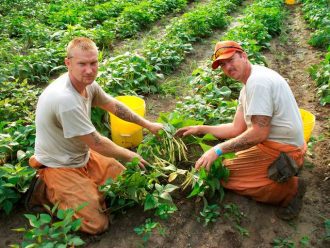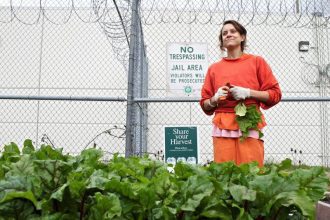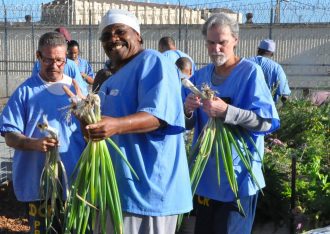Contributing writer for Wake Up World
In the U.S., there are more prisoners than farmers. In fact, according to the journal, Solutions, the U.S. housed about one-fourth of the prison population worldwide, which amounts to nearly 2.3 million people.1 Most (80 percent) of the prisoners are incarcerated for non-violent crimes such as drug charges, and the U.S. spends more than $80 billion a year on the criminal justice system alone. The implications of spending so much on prisons, not only financially but socially, are concerning, to say the least.
Today, ironically, where small family farms once stood is now an influx of new prisons dotting the rural countryside.
Prisons are often built in economically depressed areas and are touted as a tool for promoting economic growth. But this growth hinges on the continuation of crime. Efforts to stop crime would, in effect, shut down the prisons that many rural areas now depend on economically.2 Meanwhile, for all the billions being spent on incarceration and ‘criminal justice’, most inmates are not rehabilitated upon their release.
Many prisons still focus on punishment rather than rehabilitation, which means many prisoners may be angrier and harder upon their release, and may be unwilling or lack the skills necessary to function in society. According to Solutions:3
“In states such as New York, Florida and California, more is spent on keeping people in prison than is spent on higher education. In California, for example, it costs almost $45,000 to keep an inmate in prison for a year, while only $15,000 to send that same person to the state university system. For all the money allocated to locking people up, very little targets rehabilitation.”
Related reading: Criminal Rehabilitation: 1001 Benefits of Transcending
Gardening is Powerful Rehabilitation
Adding gardens to prisons may seem trite; prior to the 1970s, many prisons, including Alcatraz, had them. Then came an era when, as The Washington Post put it, “lock-’em-up-and-throw-away-the-key justice took hold.” 4 Gardens in prisons disappeared, along with their many profound, yet little-recognized, benefits.
Today some prison officials are recognizing the importance of rehabilitation. Most prisoners are released, but as it stands more than 60 percent will be sent back to prison after committing new crimes or violating parole.5 Could the simplistic act of adding gardens to prisons really help to change that?
Preliminary research in California prisons suggests that, among prisoners who participated in gardening programs, less than 10 percent returned to prison.6
Beth Waitkus, Director of the Insight Garden Program, which helps U.S. prisons establish gardens, told the Post, “The demand is huge… Prisons see the value of this. When you have to tend to a living thing, there’s a shift that happens in a person.” 7
And the prisoners aren’t the only ones who benefit. Some prison garden programs use their harvests to feed inmates, both saving money and adding to the quality and taste of the food. Some prison gardens donate food to low-income areas, allowing prisoners to give back to areas where many of them were raised. Others generate so much food that they’re even able to donate to local nursing homes and schools.
Gardening Lets Prisoners Experience Success
Part of what makes planting a garden so cathartic is that it represents a tangible measure of success. Growing food from seed, many prisoners finally experience success after a lifetime of failures, which helps to build self-esteem.
More than just work detail, today’s gardening programs don’t just teach inmates gardening skills but also allow them to take part in planning the garden and making other decisions related to the project. Solutions reported:8
“Through programs that teach the science of gardening, inmates learn that knowledge is empowerment. They shed their identity as inmates and become students. As a result, they take a greater interest in what they do, and become more skilled and passionate gardeners.
“… The hopelessness of ever finding a skilled job after release, a job that provides enjoyment and dignity in a complex technological world, is replaced by a greater sense of purpose.”
Former inmates that took part in prison gardening programs may even be able to use those skills upon their release. For instance, the California-based group Planting Justice, which helps to build gardens in inner-city areas, has hired former inmates to work on their landscaping jobs.
 Connecting Prisons with Nature
Connecting Prisons with Nature
The Washington-state-based Sustainability in Prisons Project (SPP) goes beyond gardening and is working toward comprehensive “greening” strategies at correctional facilities.
In addition to gardens, SPP helps such institutions to establish recycling programs, composting and green job training for inmates. Their activities include:9
- Educating and training inmates in science and conservation
- Conservation projects involving inmates, including caring for western pond turtles and propagating native prairie plants
- Helping inmates and staff develop sustainable operations such as recycling and composting
- Contributing to the community; in 2015, SPP donated more than 400,000 pounds of fresh produce to food banks and prisons and 30,000 hand-crafted items to non-profit organizations
Meanwhile, the Philadelphia Prison System (PSS) also operates a composting program that keeps 685 tons of food waste out of landfills every year. Inmates in the Philadelphia prison system were generating 1.4 pounds of food waste per person per day, which is part of what prompted the composting program. PSS built a composting facility via a grant from the U.S. Environmental Protection Agency (EPA) and now creates so much “black gold” that they give it away to the community for free. The program also saves Philadelphia $40,000 a year in landfill costs.10
There’s also the Philadelphia Prison Orchard Project, which got its start from a donation of 200 fruit trees. The prison-created compost is used to fertilize the orchard, and inmates are able to work in both areas.
PPS has also partnered with Temple University and inmates can earn a vocational certificate in organic farming after completing the program.
Sources and references:
- Civil Eats October 17, 2016
- The Washington Post June 7, 2015
- NPR January 12, 2014
- The Solutions Journal May 2013
- 1, 3, 5, 8 The Solutions Journal May 2013
- 2 Prison Policy 2002
- 4, 6, 7 The Washington Post June 7, 2015
- 9 Sustainability in Prisons, What We Do
- 10 Civil Eats October 17, 2016
About the author:
Born and raised in the inner city of Chicago, IL, Dr. Joseph Mercola is an osteopathic physician trained in both traditional and natural medicine. Board-certified in family medicine, Dr. Mercola served as the chairman of the family medicine department at St. Alexius Medical Center for five years, and in 2012 was granted fellowship status by the American College of Nutrition (ACN).
While in practice in the late 80s, Dr. Mercola realized the drugs he was prescribing to chronically ill patients were not working. By the early 90s, he began exploring the world of natural medicine, and soon changed the way he practiced medicine.
In 1997 Dr. Mercola founded Mercola.com, which is now routinely among the top 10 health sites on the internet. His passion is to transform the traditional medical paradigm in the United States. “The existing medical establishment is responsible for killing and permanently injuring millions of Americans… You want practical health solutions without the hype, and that’s what I offer.”
Visit Mercola.com for more information, or read Dr. Mercola’s full bio and résumé here.
Recommended articles by Dr. Joseph Mercola:
- Basic Yoga Moves to Improve Balance, Mood and Flexibility
- Medical Errors: Still the Third Leading Cause of Death
- Battered Bees and the Threat to Our Food Supply
- Plants Are Smarter Than You Think
- Scientific Links Between Processed Foods and Depression
- How Sugar Harms Your Brain Health and Drives Alzheimer’s Epidemic
- The Health Benefits of Intermittent Fasting
- Can a Hug a Day Keep Infection Away?
- The Magic Healing Power of Mushrooms
- The Science of Healing Thoughts
- Caring for an Aging or Dying Pet – What You Need to Know (and Some Help with Your Grief)

If you've found value in our articles, we invite you to support the release of our brand-new book, "Gratitude Practices for Kids: A Practical Guide for Adults to Instill a Spirit of Appreciation and Positivity in the Next Generation."
"Gratitude Practices for Kids" brings together over 25 innovative and accessible practices designed to enhance gratitude in everyday life. This comprehensive guide is backed by 17 scientific studies, ensuring each concept is grounded in research, underscoring our commitment to nurturing growth, emotional intelligence, and positive interactions between adults and children.
We encourage you to opt for the paperback version to celebrate this new release. Dive into its fresh pages away from digital distractions, allowing you to immerse yourself in the transformative practices it offers.
Over recent years, Wake Up World has faced significant online censorship, which has impacted our financial ability to operate. Moving into book publishing represents a strategic step to secure the ongoing funds needed to continue our mission. By purchasing Gratitude for Kids, you help us keep our content free and accessible to everyone, avoiding needing a paywall. With over 8,500 articles published in the last 13 years, we remain dedicated to keeping our valuable content open to all.










